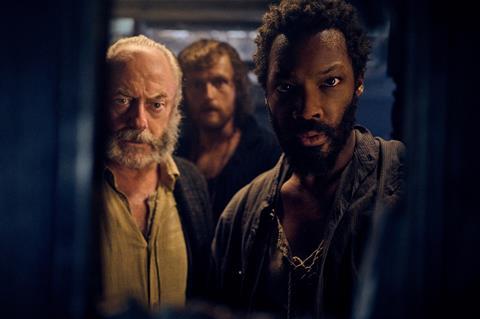A doomed ship in more ways than one

Dir: Andre Ovredal. US. 2023. 119mins
“Evil is on board,” intones one of the main characters in The Last Voyage Of The Demeter, a period horror film whose rich sense of dread easily outclasses everything else on its waterlogged adventure. Director Andre Ovredal casts Corey Hawkins as a 19th-century English doctor who, along with the rest of the seamen on the doomed vessel, will do battle with Dracula, who has smuggled himself onto the ship in search of fresh prey. Adapted from a chapter in Bram Stoker’s novel, the picture initially has some gory fun with its close-quarters suspense, but Ovredal unsuccessfully tries to elevate his monster movie with flimsy psychological depth and unconvincing emotional underpinnings.
Spooky, old-fashioned foreboding
Universal releases Last Voyage in the US on August 11. (In the UK the film, which is titled Dracula: Voyage Of The Demeter, opens a week later.) There’s not much horror competition at the multiplex, but dismissive reviews may further hurt a picture which is coming out at the tail end of summer movie season. Last Voyage may attract attention on streaming around Halloween, but even then fans of vampire films may find little at stake here.
The year is 1897, and Clemens (Hawkins) has talked his way onto the Demeter, a merchant ship leaving Romania and heading back to England. The crusty crew is suspicious of this soft-spoken outsider, but soon they will have a bigger concern when livestock starts being slaughtered and men go missing. It’s all the work of the ferocious Count Dracula (Javier Botet), who is hiding below deck, waiting to pounce.
Early on, Norwegian director Ovredal (Trollhunter, Scary Stories To Tell In The Dark) hints that tragedy awaits these characters. Between the film’s title and the outcome of the individuals in Stoker’s novel, it’s obvious audiences shouldn’t expect a happy ending, but even so, there’s a satisfying aura of doom hovering over the proceedings. Bear McCreary’s groaning, operatic score only further amplifies the gothic gloom as Clemens, the Demeter’s rugged veteran captain Eliot (Liam Cunningham) and the rest of the crew slowly grasp the nature of the threat which descends upon them each night.
What’s intriguing, but ultimately frustrating, about Last Voyage is that it exists at a time when the world is unfamiliar with vampires. The panicked confusion creates an additional layer of terror — no one has seen anything like this creature who bites into necks, feasting on blood — but that chaos becomes less interesting once Ovredal starts intentionally withholding information from Clemens and the others.
A key example of this is with Aisling Franciosi, who plays Anna, a young woman who has been smuggled onto the Demeter along with Dracula - he has been sucking her blood to stay alive during the early stages of hte voyage. But when the crew finds and rescues Anna, they ask her next to nothing about this monster — which is inexplicable considering she (and her entire village) knows everything about how he operates.
Sadly, this is just one way in which screenwriters Bragi Schut, Jr. and Zak Olkewicz craft convoluted obstacles for our heroes. As Wojchek, the ship’s strong-willed first mate, David Dastmalchian is forced to play a sailor who, no matter what, objects to Clemens’ sound reasoning, constantly complicating matters simply because the script needs there to be conflict between the crewmembers. Additionally, Eliot’s scrappy grandson Toby (C’mon C’mon’s Woody Norman) can be counted on to thoughtlessly put himself into peril, even after he has been explicitly told to stay inside with the door locked.
When Last Voyage is focused on scare sequences, the film jolts to life, and Ovredal imbues the scenes with spooky, old-fashioned foreboding. Trapped in the middle of the ocean, their destination still weeks away, the Demeter’s crew learn that night is when the beast will strike, each sunset generating palpable anxiety. Ovredal merely hints at Dracula’s hideous countenance, showing him in shadow for a few brief moments before he attacks again, bloody carnage and anguished shrieks left in his wake. There are vague hints of F.W. Murnau’s Nosferatu in the film’s depiction of this demonic figure, and the relatively low-tech battle between the men and the monster — the crew only have knives and rifles to battle this fleet menace — has a pleasingly primitive urgency.
But Hawkins is the only member of the ensemble given much room to develop a well-rounded character, and even then only barely. And as the body count starts to mount, Last Voyage grows more ponderous, observing as paranoia overtakes the crew, turning them against one another. Because Ovredal never sees the characters beyond horror-film types, it’s hard to be invested in their collective terror about an evil they cannot comprehend. The Demeter is headed to a bad end, but Last Voyage capsizes even earlier.
Production companies: Phoenix Pictures, Wise Owl Media
Worldwide distribution: Universal Pictures
Producers: Bradley J. Fischer, Mike Medavoy, Arnold W. Messner
Screenplay: Bragi Schut, Jr., and Zak Olkewicz, from a screen story by Bragi Schut, Jr., based on the log of the Demeter from Bram Stoker’s Dracula
Cinematography: Tom Stern
Production design: Edward Thomas
Editing: Patrick Larsgaard
Music: Bear McCreary
Main cast: Corey Hawkins, Aisling Franciosi, David Dastmalchian, Javier Botet, Liam Cunningham, Woody Norman
























